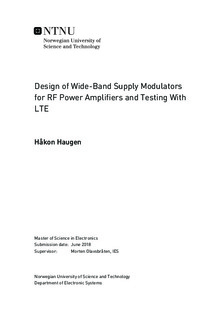Design of Wide-Band Supply Modulators for RF Power Amplifiers and Testing With LTE
Master thesis
Permanent lenke
http://hdl.handle.net/11250/2567691Utgivelsesdato
2018Metadata
Vis full innførselSamlinger
Sammendrag
In this thesis, the effect of tracked RF amplifiers on modern LTE waveforms are studied. A tracked amplifier is an amplifier with a modulated supply voltage that tracks some wanted function of the base-band. LTE uses the particularly demanding OFDM modulation scheme on its downlink. Tracking amplifiers use an RFPA with modulated supply voltage to lower the voltage in parts of the transmission where the transmit power is low. Different tracking functions are compared both in simulation and with real results.
The design of high bandwidth trackers is also studied, with two trackers built and tested. The trackers use high-frequency design techniques and deliver up to 100 MHz of usable tracker bandwidth. A design based on cascaded current-feedback operational amplifiers are used. Two THS3001 amplifiers deliver a combined gain of 86 V/V and a voltage buffer output stage with either 6x THS3001 or a single ADA4870 provide around 1 A of current.
The THS3001 tracker (the design that provided the highest bandwidth) is used to test LTE performance with an RFPA based on a 10 W Gan HEMT. Tests are conducted with 10 and 20 MHz LTE channels and corresponding tracker waveforms with up to 40 MHz bandwidth.
The tracker functions tested are tracking; max PAE, constant gain, power envelope and power envelope with a higher order polynomial. The PET and constant gain provide high linearity while the 2nd order PET and max PAE provide high efficiency. For LTE it is shown that power envelope tracking is the superior technique for modulating the supply voltage.
